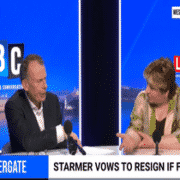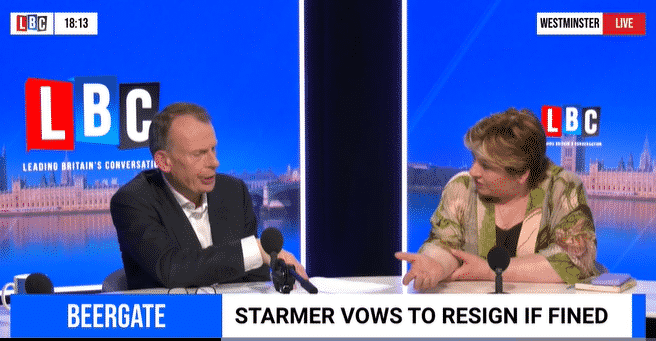Handling Hypotheticals
Hypothetical questions seem to be loved by media interviewers almost as much as they are hated by media interviewees.
This is because the “What would happen if?” or “What would you do if?”’ scenarios that they involve are never positive ones for the guest concerned. For example, you can’t imagine a politician being offered the question “What would happen if your party/cause/campaign became immensely popular and received more support than any other?”
The problem for the interviewee is that simply entertaining the idea of the negative outcome taking place – regardless of the fact it might never happen – heightens the awareness that it could occur and immediately drags the interview down what is, for them, a less helpful line of approach.
This is precisely what happened during a good-natured spat between LBC presenter Andrew Marr and Shadow Attorney General Emily Thornberry last week. It followed the announcement from Labour leader Sir Keir Starmer that both he and his deputy Angela Rayner would resign, should they be fined by police after being investigated for rule-breaking during the pandemic:
AM: That would leave your party suddenly leaderless. What arrangements do you have in your party to ensure that somebody takes over?
ET: Well – look. [PAUSE] He’s not going to resign because he hasn’t done anything wrong. And Angela won’t resign because she hasn’t done anything wrong.
Notice how Thornberry refuses to indulge Marr in his hypothesis and states her belief that the problem he puts forward is not going to happen anyway. However, her job is made more difficult because the hypothetical scenario involved was actually brought about by her party leader – as Marr immediately points out:
AM: Well, he… he raised the possibility himself this afternoon – all I’m asking you is, if that happens – you can’t have a leaderless opposition presumably – does the NEC step in and appoint somebody, what happens?
This puts Thornberry in a tricky situation. Her interviewer, is, after all, only legitimately asking questions about something her party leader has brought up. Nevertheless, her dislike of the hypothetical question is so great, she responds by spending most of the time stating what is currently happening (rather than trying to forecast the future) and then repeating her view that it’s unlikely to happen. Notice the length of her answer (a full 24 seconds) as well as how hesitant it is, for someone who is usually a very fluent interviewee:
ET: [PAUSE] At the moment, all we are doing, is we are holding this government to account. We are preparing for the Queen’s speech which is happening tomorrow. And – er – and preparing for the… for our opposition and our holding the government to account when it comes to the next term, and the – er – legislative programme that the government is going to be putting forward. Er – we will wait and see what happens next, but I am confident that he will not be fined because he has done nothing wrong.
But Marr is not going to give up that easily:
AM: Well I’m… I’m still sticking with the possibility that he raised himself – I didn’t raise it, he raised it – um… this afternoon. And if that happens, and you are left leaderless, can you at least reassure people that we won’t have months and months and months of a… a Labour Party leadership campaign going on?
In these circumstances, Thornberry clearly feels that refusing to get involved for a third time isn’t really an option – so she gives a short, curt, factual reply, which at six seconds in duration is a quarter the length of her previous response:
ET: It would be a matter for the National Executive Committee to decide what to do next; how long any leadership campaign would be.
Marr, having finally got her onto his line of thinking, then piles a second hypothetical question onto the first…
AM: Um – and would you be confident you’d get a leader by the time of the party conference in October?
… which prompts his interviewee to explain why hypothetical questions are so reviled:
ET: [PAUSE] You see! I answer one hypothetical and then another hypothetical comes. This is the reason why politicians don’t answer hypothetical questions at all. And we do it as politely as we can!
AM: It’s not an unreasonable question…
ET: No, but the trouble is, you can’t build a hypothetical on top of another hypothetical on top of another hypothetical. You just can’t!
AM: I’ve… I’ve had a very long career doing exactly that!
ET: And I’ve had long career not answering such questions! [LAUGHS]
AM: [LAUGHS] You certainly have! Emily Thornberry, thank you very much for coming in and not answering that question!
In usual circumstances, we would normally suggest that hypothetical questions are revealed as such (“I don’t have a crystal ball…” or “I can’t possibly predict what might happen in the future…” or “We’ll have to see what plays out…”) followed by a ‘bridging’ expression which allows you to talk about something else instead (“…but what I can tell you is…”).
However, such a response wasn’t possible in the interaction above precisely because the imagined scenario being debated was brought up by her own side; refusing to talk about a hypothesis your own team have created is impossible to do convincingly. Labour’s spin machine would have realised this, of course, but would have felt that for Sir Keir to have taken the high moral ground on this issue was worth the consequences that might follow.
What’s more, the good nature of the interaction worked well for both interviewer and interviewee. So, on such occasions, it’s often worth keeping the tone of the conversation light, if possible.
- Introducing the ‘Act Out’: - October 29, 2024
- Politics as Entertainment - July 2, 2024
- All Presenters Need a Critical Friend - April 23, 2024





thanks for info